Consumer Protection Law: Unethical Conduct Long Problem Solution
VerifiedAdded on 2022/09/28
|9
|3917
|25
Homework Assignment
AI Summary
This document provides a detailed analysis of a consumer protection law case study, addressing multiple legal issues under the Australian Consumer Law (ACL). The assignment examines whether Ingrid/Wine Stores Australia Corp and Valentine/Middleton WineStore engaged in misleading or deceptive conduct under s18 ACL, analyzing the elements required to prove a breach. It further investigates whether Ingrid/Wine Stores Australia Corp acted unconscionably and whether a term in a franchise agreement is void under s23 ACL, considering the definition of unfair terms and standard form contracts. Finally, it assesses if Valentine/Middleton WineStore contravened s29 ACL by making false representations. The document also addresses unsolicited consumer agreements and potential breaches of the ACL by Vinay, focusing on prohibited conduct and permitted hours for negotiation.
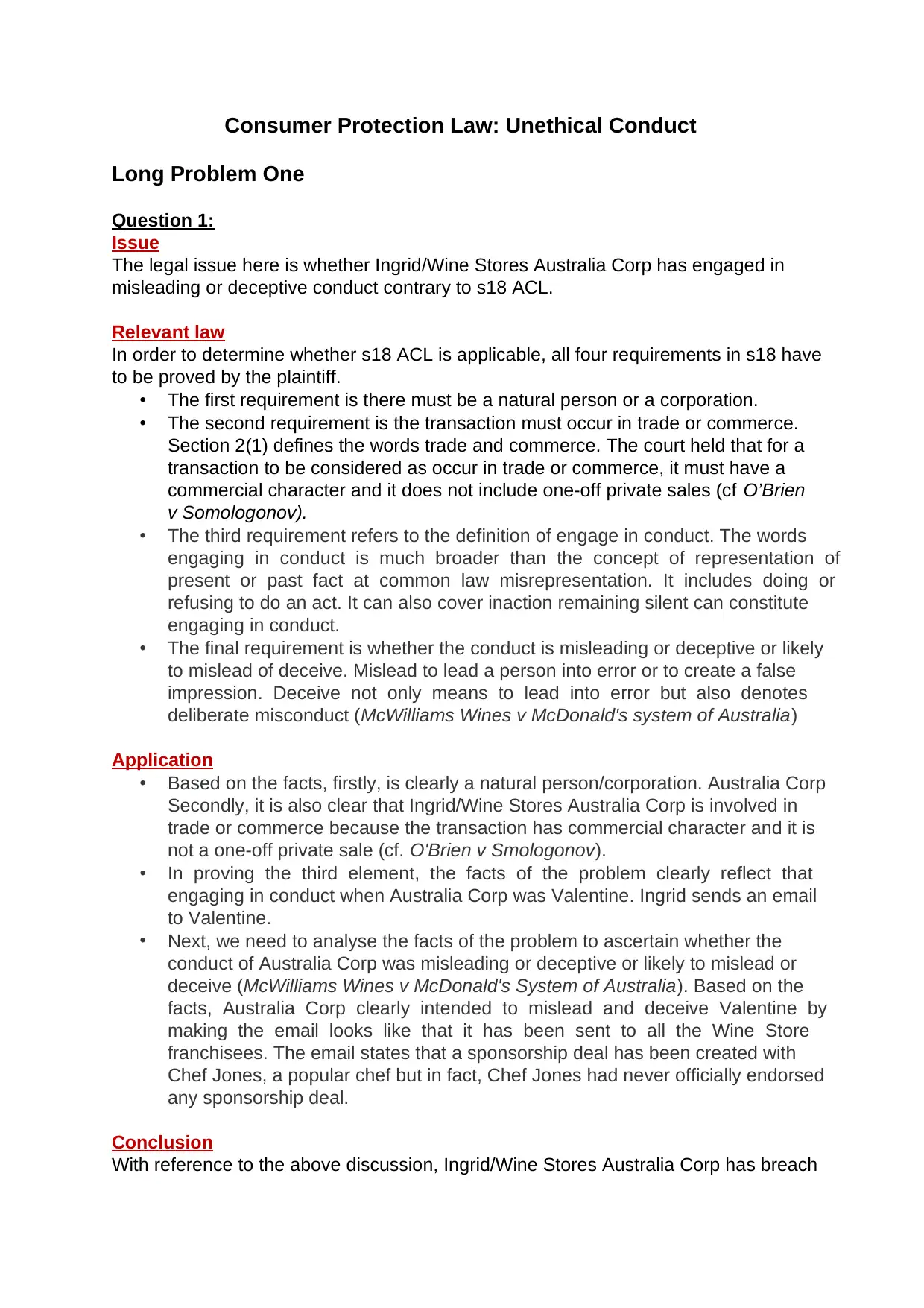
Consumer Protection Law: Unethical Conduct
Long Problem One
Question 1:
Issue
The legal issue here is whether Ingrid/Wine Stores Australia Corp has engaged in
misleading or deceptive conduct contrary to s18 ACL.
Relevant law
In order to determine whether s18 ACL is applicable, all four requirements in s18 have
to be proved by the plaintiff.
• The first requirement is there must be a natural person or a corporation.
• The second requirement is the transaction must occur in trade or commerce.
Section 2(1) defines the words trade and commerce. The court held that for a
transaction to be considered as occur in trade or commerce, it must have a
commercial character and it does not include one-off private sales (cf O’Brien
v Somologonov).
• The third requirement refers to the definition of engage in conduct. The words
engaging in conduct is much broader than the concept of representation of
present or past fact at common law misrepresentation. It includes doing or
refusing to do an act. It can also cover inaction remaining silent can constitute
engaging in conduct.
• The final requirement is whether the conduct is misleading or deceptive or likely
to mislead of deceive. Mislead to lead a person into error or to create a false
impression. Deceive not only means to lead into error but also denotes
deliberate misconduct (McWilliams Wines v McDonald's system of Australia)
Application
• Based on the facts, firstly, is clearly a natural person/corporation. Australia Corp
Secondly, it is also clear that Ingrid/Wine Stores Australia Corp is involved in
trade or commerce because the transaction has commercial character and it is
not a one-off private sale (cf. O'Brien v Smologonov).
• In proving the third element, the facts of the problem clearly reflect that
engaging in conduct when Australia Corp was Valentine. Ingrid sends an email
to Valentine.
• Next, we need to analyse the facts of the problem to ascertain whether the
conduct of Australia Corp was misleading or deceptive or likely to mislead or
deceive (McWilliams Wines v McDonald's System of Australia). Based on the
facts, Australia Corp clearly intended to mislead and deceive Valentine by
making the email looks like that it has been sent to all the Wine Store
franchisees. The email states that a sponsorship deal has been created with
Chef Jones, a popular chef but in fact, Chef Jones had never officially endorsed
any sponsorship deal.
Conclusion
With reference to the above discussion, Ingrid/Wine Stores Australia Corp has breach
Long Problem One
Question 1:
Issue
The legal issue here is whether Ingrid/Wine Stores Australia Corp has engaged in
misleading or deceptive conduct contrary to s18 ACL.
Relevant law
In order to determine whether s18 ACL is applicable, all four requirements in s18 have
to be proved by the plaintiff.
• The first requirement is there must be a natural person or a corporation.
• The second requirement is the transaction must occur in trade or commerce.
Section 2(1) defines the words trade and commerce. The court held that for a
transaction to be considered as occur in trade or commerce, it must have a
commercial character and it does not include one-off private sales (cf O’Brien
v Somologonov).
• The third requirement refers to the definition of engage in conduct. The words
engaging in conduct is much broader than the concept of representation of
present or past fact at common law misrepresentation. It includes doing or
refusing to do an act. It can also cover inaction remaining silent can constitute
engaging in conduct.
• The final requirement is whether the conduct is misleading or deceptive or likely
to mislead of deceive. Mislead to lead a person into error or to create a false
impression. Deceive not only means to lead into error but also denotes
deliberate misconduct (McWilliams Wines v McDonald's system of Australia)
Application
• Based on the facts, firstly, is clearly a natural person/corporation. Australia Corp
Secondly, it is also clear that Ingrid/Wine Stores Australia Corp is involved in
trade or commerce because the transaction has commercial character and it is
not a one-off private sale (cf. O'Brien v Smologonov).
• In proving the third element, the facts of the problem clearly reflect that
engaging in conduct when Australia Corp was Valentine. Ingrid sends an email
to Valentine.
• Next, we need to analyse the facts of the problem to ascertain whether the
conduct of Australia Corp was misleading or deceptive or likely to mislead or
deceive (McWilliams Wines v McDonald's System of Australia). Based on the
facts, Australia Corp clearly intended to mislead and deceive Valentine by
making the email looks like that it has been sent to all the Wine Store
franchisees. The email states that a sponsorship deal has been created with
Chef Jones, a popular chef but in fact, Chef Jones had never officially endorsed
any sponsorship deal.
Conclusion
With reference to the above discussion, Ingrid/Wine Stores Australia Corp has breach
Paraphrase This Document
Need a fresh take? Get an instant paraphrase of this document with our AI Paraphraser
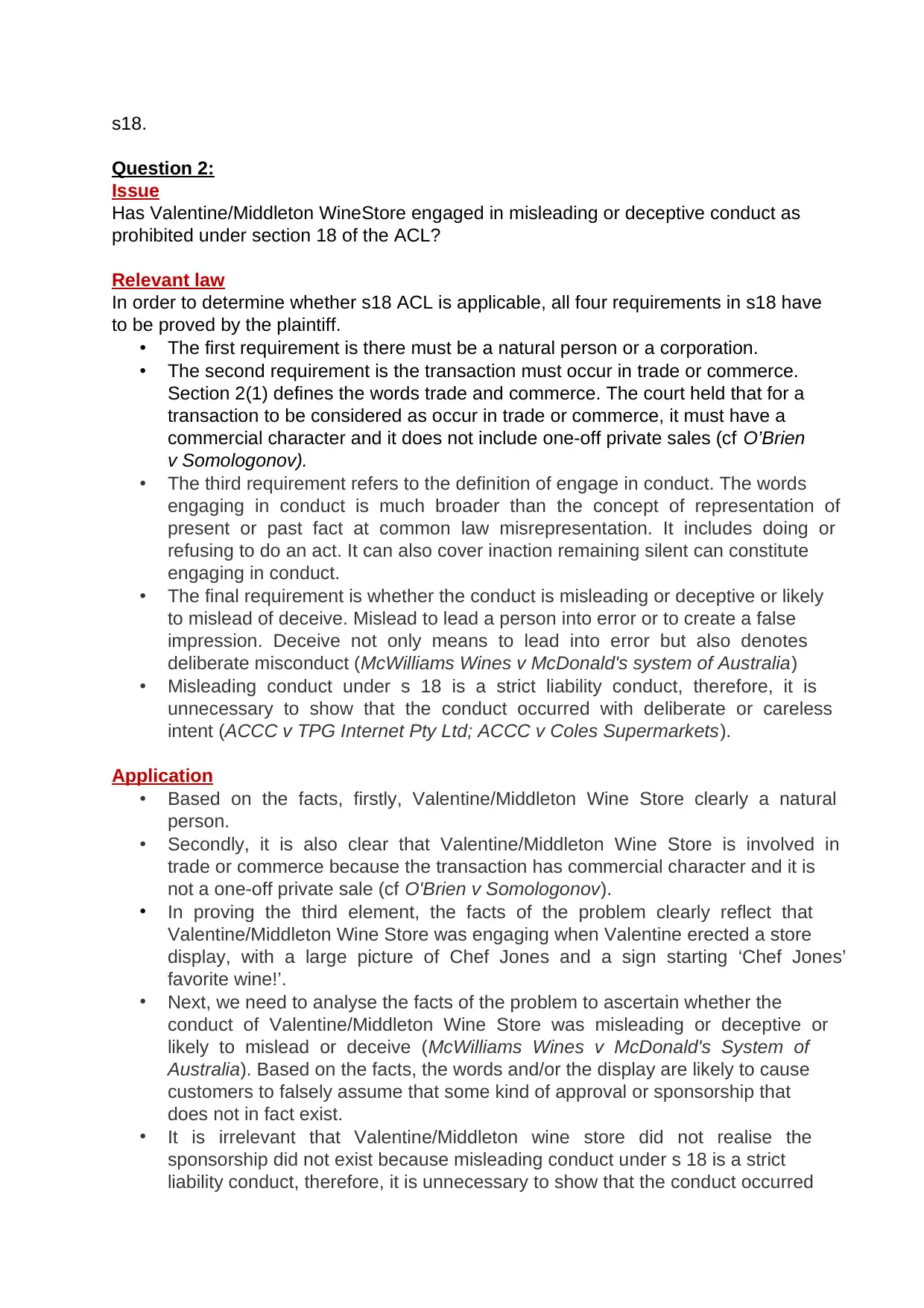
s18.
Question 2:
Issue
Has Valentine/Middleton WineStore engaged in misleading or deceptive conduct as
prohibited under section 18 of the ACL?
Relevant law
In order to determine whether s18 ACL is applicable, all four requirements in s18 have
to be proved by the plaintiff.
• The first requirement is there must be a natural person or a corporation.
• The second requirement is the transaction must occur in trade or commerce.
Section 2(1) defines the words trade and commerce. The court held that for a
transaction to be considered as occur in trade or commerce, it must have a
commercial character and it does not include one-off private sales (cf O’Brien
v Somologonov).
• The third requirement refers to the definition of engage in conduct. The words
engaging in conduct is much broader than the concept of representation of
present or past fact at common law misrepresentation. It includes doing or
refusing to do an act. It can also cover inaction remaining silent can constitute
engaging in conduct.
• The final requirement is whether the conduct is misleading or deceptive or likely
to mislead of deceive. Mislead to lead a person into error or to create a false
impression. Deceive not only means to lead into error but also denotes
deliberate misconduct (McWilliams Wines v McDonald's system of Australia)
• Misleading conduct under s 18 is a strict liability conduct, therefore, it is
unnecessary to show that the conduct occurred with deliberate or careless
intent (ACCC v TPG Internet Pty Ltd; ACCC v Coles Supermarkets).
Application
• Based on the facts, firstly, Valentine/Middleton Wine Store clearly a natural
person.
• Secondly, it is also clear that Valentine/Middleton Wine Store is involved in
trade or commerce because the transaction has commercial character and it is
not a one-off private sale (cf O'Brien v Somologonov).
• In proving the third element, the facts of the problem clearly reflect that
Valentine/Middleton Wine Store was engaging when Valentine erected a store
display, with a large picture of Chef Jones and a sign starting ‘Chef Jones’
favorite wine!’.
• Next, we need to analyse the facts of the problem to ascertain whether the
conduct of Valentine/Middleton Wine Store was misleading or deceptive or
likely to mislead or deceive (McWilliams Wines v McDonald's System of
Australia). Based on the facts, the words and/or the display are likely to cause
customers to falsely assume that some kind of approval or sponsorship that
does not in fact exist.
• It is irrelevant that Valentine/Middleton wine store did not realise the
sponsorship did not exist because misleading conduct under s 18 is a strict
liability conduct, therefore, it is unnecessary to show that the conduct occurred
Question 2:
Issue
Has Valentine/Middleton WineStore engaged in misleading or deceptive conduct as
prohibited under section 18 of the ACL?
Relevant law
In order to determine whether s18 ACL is applicable, all four requirements in s18 have
to be proved by the plaintiff.
• The first requirement is there must be a natural person or a corporation.
• The second requirement is the transaction must occur in trade or commerce.
Section 2(1) defines the words trade and commerce. The court held that for a
transaction to be considered as occur in trade or commerce, it must have a
commercial character and it does not include one-off private sales (cf O’Brien
v Somologonov).
• The third requirement refers to the definition of engage in conduct. The words
engaging in conduct is much broader than the concept of representation of
present or past fact at common law misrepresentation. It includes doing or
refusing to do an act. It can also cover inaction remaining silent can constitute
engaging in conduct.
• The final requirement is whether the conduct is misleading or deceptive or likely
to mislead of deceive. Mislead to lead a person into error or to create a false
impression. Deceive not only means to lead into error but also denotes
deliberate misconduct (McWilliams Wines v McDonald's system of Australia)
• Misleading conduct under s 18 is a strict liability conduct, therefore, it is
unnecessary to show that the conduct occurred with deliberate or careless
intent (ACCC v TPG Internet Pty Ltd; ACCC v Coles Supermarkets).
Application
• Based on the facts, firstly, Valentine/Middleton Wine Store clearly a natural
person.
• Secondly, it is also clear that Valentine/Middleton Wine Store is involved in
trade or commerce because the transaction has commercial character and it is
not a one-off private sale (cf O'Brien v Somologonov).
• In proving the third element, the facts of the problem clearly reflect that
Valentine/Middleton Wine Store was engaging when Valentine erected a store
display, with a large picture of Chef Jones and a sign starting ‘Chef Jones’
favorite wine!’.
• Next, we need to analyse the facts of the problem to ascertain whether the
conduct of Valentine/Middleton Wine Store was misleading or deceptive or
likely to mislead or deceive (McWilliams Wines v McDonald's System of
Australia). Based on the facts, the words and/or the display are likely to cause
customers to falsely assume that some kind of approval or sponsorship that
does not in fact exist.
• It is irrelevant that Valentine/Middleton wine store did not realise the
sponsorship did not exist because misleading conduct under s 18 is a strict
liability conduct, therefore, it is unnecessary to show that the conduct occurred
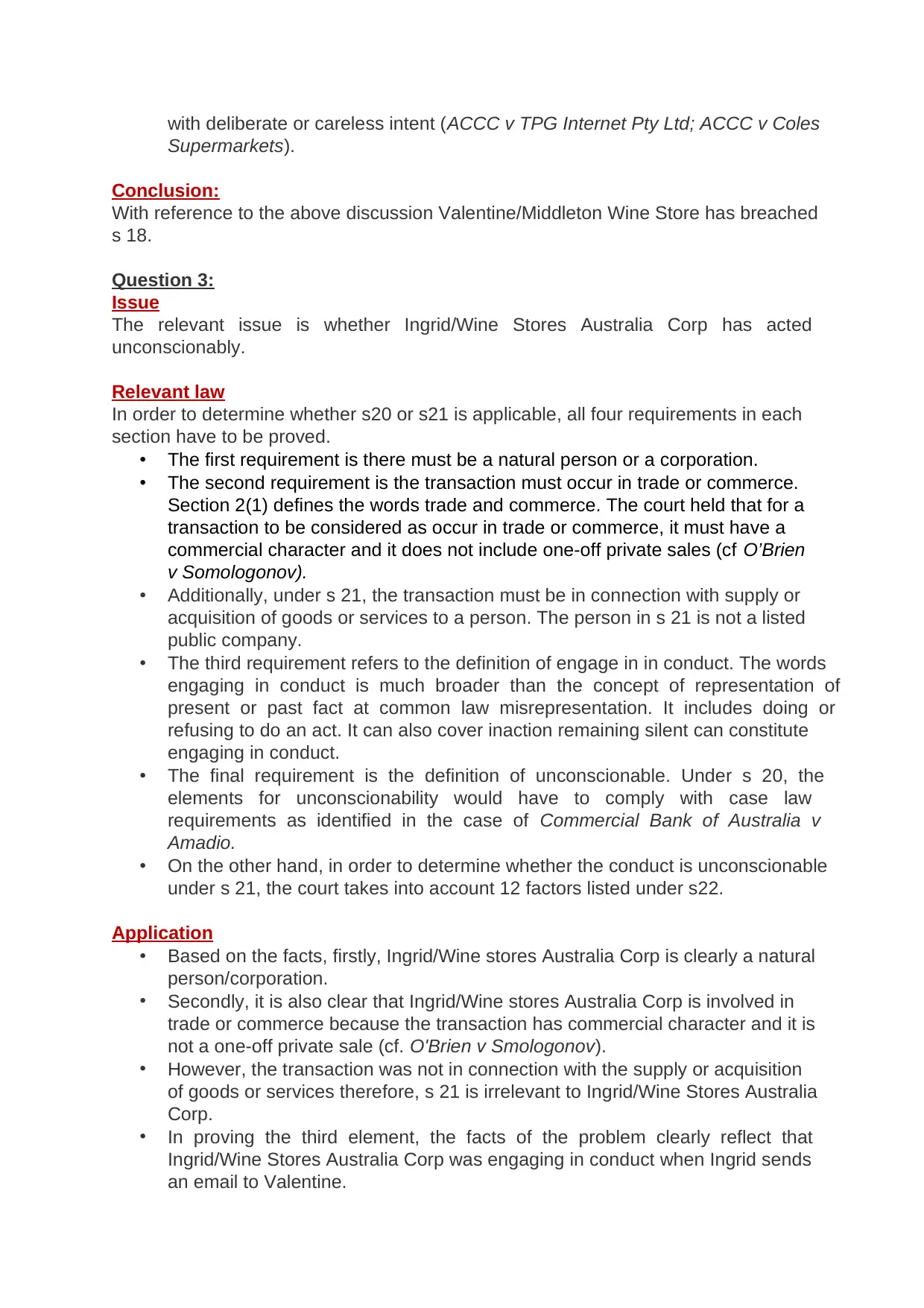
with deliberate or careless intent (ACCC v TPG Internet Pty Ltd; ACCC v Coles
Supermarkets).
Conclusion:
With reference to the above discussion Valentine/Middleton Wine Store has breached
s 18.
Question 3:
Issue
The relevant issue is whether Ingrid/Wine Stores Australia Corp has acted
unconscionably.
Relevant law
In order to determine whether s20 or s21 is applicable, all four requirements in each
section have to be proved.
• The first requirement is there must be a natural person or a corporation.
• The second requirement is the transaction must occur in trade or commerce.
Section 2(1) defines the words trade and commerce. The court held that for a
transaction to be considered as occur in trade or commerce, it must have a
commercial character and it does not include one-off private sales (cf O’Brien
v Somologonov).
• Additionally, under s 21, the transaction must be in connection with supply or
acquisition of goods or services to a person. The person in s 21 is not a listed
public company.
• The third requirement refers to the definition of engage in in conduct. The words
engaging in conduct is much broader than the concept of representation of
present or past fact at common law misrepresentation. It includes doing or
refusing to do an act. It can also cover inaction remaining silent can constitute
engaging in conduct.
• The final requirement is the definition of unconscionable. Under s 20, the
elements for unconscionability would have to comply with case law
requirements as identified in the case of Commercial Bank of Australia v
Amadio.
• On the other hand, in order to determine whether the conduct is unconscionable
under s 21, the court takes into account 12 factors listed under s22.
Application
• Based on the facts, firstly, Ingrid/Wine stores Australia Corp is clearly a natural
person/corporation.
• Secondly, it is also clear that Ingrid/Wine stores Australia Corp is involved in
trade or commerce because the transaction has commercial character and it is
not a one-off private sale (cf. O'Brien v Smologonov).
• However, the transaction was not in connection with the supply or acquisition
of goods or services therefore, s 21 is irrelevant to Ingrid/Wine Stores Australia
Corp.
• In proving the third element, the facts of the problem clearly reflect that
Ingrid/Wine Stores Australia Corp was engaging in conduct when Ingrid sends
an email to Valentine.
Supermarkets).
Conclusion:
With reference to the above discussion Valentine/Middleton Wine Store has breached
s 18.
Question 3:
Issue
The relevant issue is whether Ingrid/Wine Stores Australia Corp has acted
unconscionably.
Relevant law
In order to determine whether s20 or s21 is applicable, all four requirements in each
section have to be proved.
• The first requirement is there must be a natural person or a corporation.
• The second requirement is the transaction must occur in trade or commerce.
Section 2(1) defines the words trade and commerce. The court held that for a
transaction to be considered as occur in trade or commerce, it must have a
commercial character and it does not include one-off private sales (cf O’Brien
v Somologonov).
• Additionally, under s 21, the transaction must be in connection with supply or
acquisition of goods or services to a person. The person in s 21 is not a listed
public company.
• The third requirement refers to the definition of engage in in conduct. The words
engaging in conduct is much broader than the concept of representation of
present or past fact at common law misrepresentation. It includes doing or
refusing to do an act. It can also cover inaction remaining silent can constitute
engaging in conduct.
• The final requirement is the definition of unconscionable. Under s 20, the
elements for unconscionability would have to comply with case law
requirements as identified in the case of Commercial Bank of Australia v
Amadio.
• On the other hand, in order to determine whether the conduct is unconscionable
under s 21, the court takes into account 12 factors listed under s22.
Application
• Based on the facts, firstly, Ingrid/Wine stores Australia Corp is clearly a natural
person/corporation.
• Secondly, it is also clear that Ingrid/Wine stores Australia Corp is involved in
trade or commerce because the transaction has commercial character and it is
not a one-off private sale (cf. O'Brien v Smologonov).
• However, the transaction was not in connection with the supply or acquisition
of goods or services therefore, s 21 is irrelevant to Ingrid/Wine Stores Australia
Corp.
• In proving the third element, the facts of the problem clearly reflect that
Ingrid/Wine Stores Australia Corp was engaging in conduct when Ingrid sends
an email to Valentine.
⊘ This is a preview!⊘
Do you want full access?
Subscribe today to unlock all pages.

Trusted by 1+ million students worldwide
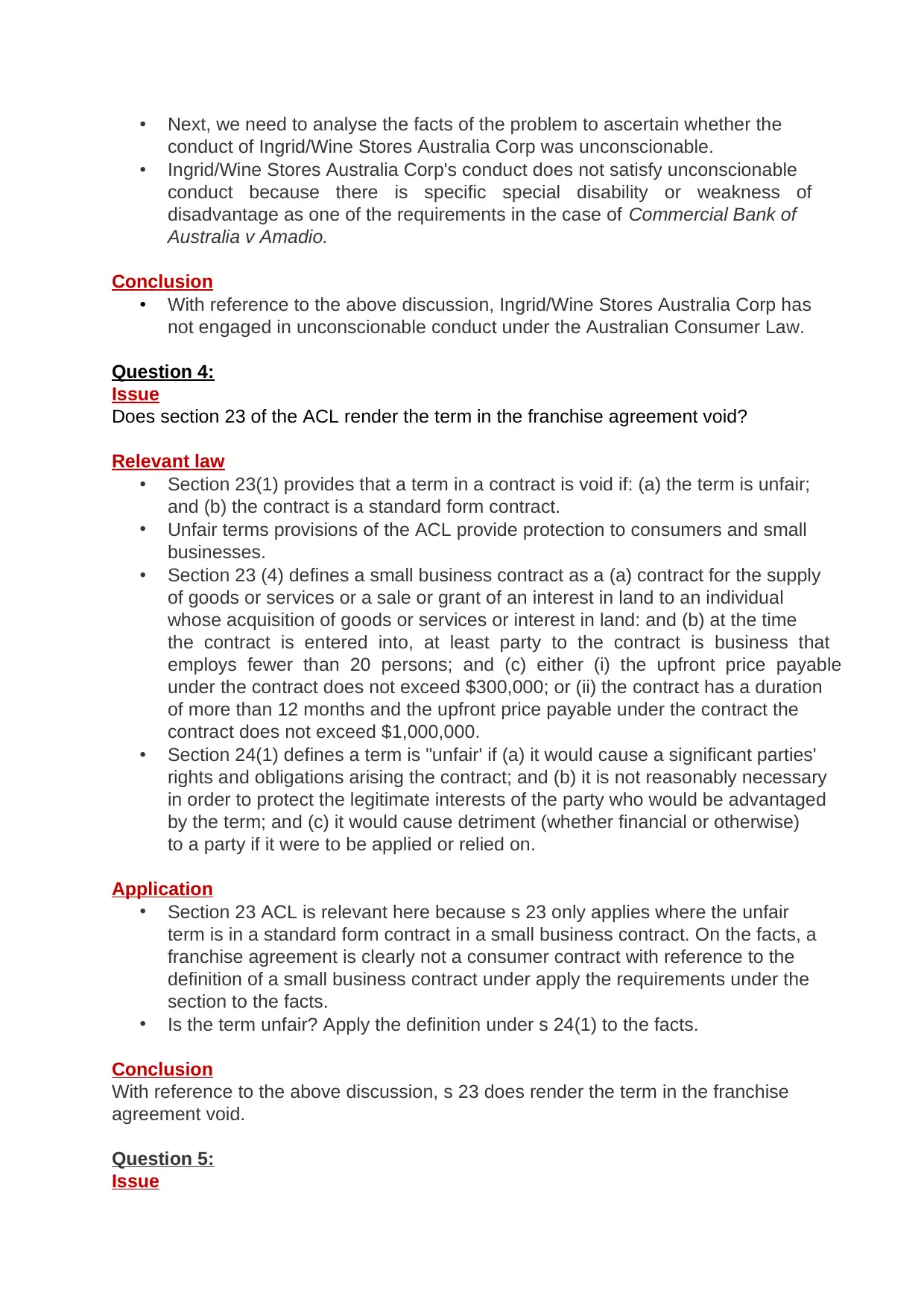
• Next, we need to analyse the facts of the problem to ascertain whether the
conduct of Ingrid/Wine Stores Australia Corp was unconscionable.
• Ingrid/Wine Stores Australia Corp's conduct does not satisfy unconscionable
conduct because there is specific special disability or weakness of
disadvantage as one of the requirements in the case of Commercial Bank of
Australia v Amadio.
Conclusion
• With reference to the above discussion, Ingrid/Wine Stores Australia Corp has
not engaged in unconscionable conduct under the Australian Consumer Law.
Question 4:
Issue
Does section 23 of the ACL render the term in the franchise agreement void?
Relevant law
• Section 23(1) provides that a term in a contract is void if: (a) the term is unfair;
and (b) the contract is a standard form contract.
• Unfair terms provisions of the ACL provide protection to consumers and small
businesses.
• Section 23 (4) defines a small business contract as a (a) contract for the supply
of goods or services or a sale or grant of an interest in land to an individual
whose acquisition of goods or services or interest in land: and (b) at the time
the contract is entered into, at least party to the contract is business that
employs fewer than 20 persons; and (c) either (i) the upfront price payable
under the contract does not exceed $300,000; or (ii) the contract has a duration
of more than 12 months and the upfront price payable under the contract the
contract does not exceed $1,000,000.
• Section 24(1) defines a term is "unfair' if (a) it would cause a significant parties'
rights and obligations arising the contract; and (b) it is not reasonably necessary
in order to protect the legitimate interests of the party who would be advantaged
by the term; and (c) it would cause detriment (whether financial or otherwise)
to a party if it were to be applied or relied on.
Application
• Section 23 ACL is relevant here because s 23 only applies where the unfair
term is in a standard form contract in a small business contract. On the facts, a
franchise agreement is clearly not a consumer contract with reference to the
definition of a small business contract under apply the requirements under the
section to the facts.
• Is the term unfair? Apply the definition under s 24(1) to the facts.
Conclusion
With reference to the above discussion, s 23 does render the term in the franchise
agreement void.
Question 5:
Issue
conduct of Ingrid/Wine Stores Australia Corp was unconscionable.
• Ingrid/Wine Stores Australia Corp's conduct does not satisfy unconscionable
conduct because there is specific special disability or weakness of
disadvantage as one of the requirements in the case of Commercial Bank of
Australia v Amadio.
Conclusion
• With reference to the above discussion, Ingrid/Wine Stores Australia Corp has
not engaged in unconscionable conduct under the Australian Consumer Law.
Question 4:
Issue
Does section 23 of the ACL render the term in the franchise agreement void?
Relevant law
• Section 23(1) provides that a term in a contract is void if: (a) the term is unfair;
and (b) the contract is a standard form contract.
• Unfair terms provisions of the ACL provide protection to consumers and small
businesses.
• Section 23 (4) defines a small business contract as a (a) contract for the supply
of goods or services or a sale or grant of an interest in land to an individual
whose acquisition of goods or services or interest in land: and (b) at the time
the contract is entered into, at least party to the contract is business that
employs fewer than 20 persons; and (c) either (i) the upfront price payable
under the contract does not exceed $300,000; or (ii) the contract has a duration
of more than 12 months and the upfront price payable under the contract the
contract does not exceed $1,000,000.
• Section 24(1) defines a term is "unfair' if (a) it would cause a significant parties'
rights and obligations arising the contract; and (b) it is not reasonably necessary
in order to protect the legitimate interests of the party who would be advantaged
by the term; and (c) it would cause detriment (whether financial or otherwise)
to a party if it were to be applied or relied on.
Application
• Section 23 ACL is relevant here because s 23 only applies where the unfair
term is in a standard form contract in a small business contract. On the facts, a
franchise agreement is clearly not a consumer contract with reference to the
definition of a small business contract under apply the requirements under the
section to the facts.
• Is the term unfair? Apply the definition under s 24(1) to the facts.
Conclusion
With reference to the above discussion, s 23 does render the term in the franchise
agreement void.
Question 5:
Issue
Paraphrase This Document
Need a fresh take? Get an instant paraphrase of this document with our AI Paraphraser
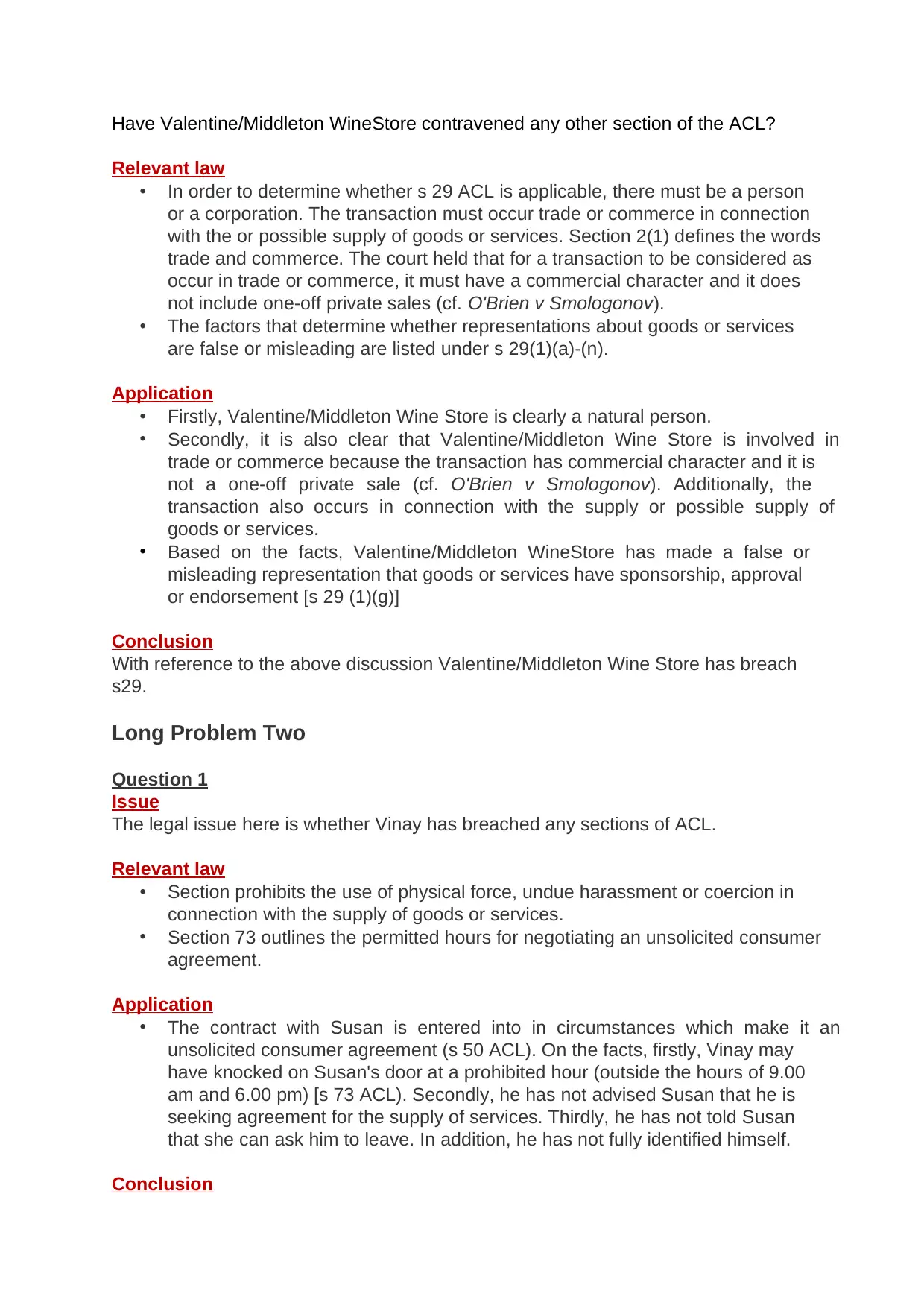
Have Valentine/Middleton WineStore contravened any other section of the ACL?
Relevant law
• In order to determine whether s 29 ACL is applicable, there must be a person
or a corporation. The transaction must occur trade or commerce in connection
with the or possible supply of goods or services. Section 2(1) defines the words
trade and commerce. The court held that for a transaction to be considered as
occur in trade or commerce, it must have a commercial character and it does
not include one-off private sales (cf. O'Brien v Smologonov).
• The factors that determine whether representations about goods or services
are false or misleading are listed under s 29(1)(a)-(n).
Application
• Firstly, Valentine/Middleton Wine Store is clearly a natural person.
• Secondly, it is also clear that Valentine/Middleton Wine Store is involved in
trade or commerce because the transaction has commercial character and it is
not a one-off private sale (cf. O'Brien v Smologonov). Additionally, the
transaction also occurs in connection with the supply or possible supply of
goods or services.
• Based on the facts, Valentine/Middleton WineStore has made a false or
misleading representation that goods or services have sponsorship, approval
or endorsement [s 29 (1)(g)]
Conclusion
With reference to the above discussion Valentine/Middleton Wine Store has breach
s29.
Long Problem Two
Question 1
Issue
The legal issue here is whether Vinay has breached any sections of ACL.
Relevant law
• Section prohibits the use of physical force, undue harassment or coercion in
connection with the supply of goods or services.
• Section 73 outlines the permitted hours for negotiating an unsolicited consumer
agreement.
Application
• The contract with Susan is entered into in circumstances which make it an
unsolicited consumer agreement (s 50 ACL). On the facts, firstly, Vinay may
have knocked on Susan's door at a prohibited hour (outside the hours of 9.00
am and 6.00 pm) [s 73 ACL). Secondly, he has not advised Susan that he is
seeking agreement for the supply of services. Thirdly, he has not told Susan
that she can ask him to leave. In addition, he has not fully identified himself.
Conclusion
Relevant law
• In order to determine whether s 29 ACL is applicable, there must be a person
or a corporation. The transaction must occur trade or commerce in connection
with the or possible supply of goods or services. Section 2(1) defines the words
trade and commerce. The court held that for a transaction to be considered as
occur in trade or commerce, it must have a commercial character and it does
not include one-off private sales (cf. O'Brien v Smologonov).
• The factors that determine whether representations about goods or services
are false or misleading are listed under s 29(1)(a)-(n).
Application
• Firstly, Valentine/Middleton Wine Store is clearly a natural person.
• Secondly, it is also clear that Valentine/Middleton Wine Store is involved in
trade or commerce because the transaction has commercial character and it is
not a one-off private sale (cf. O'Brien v Smologonov). Additionally, the
transaction also occurs in connection with the supply or possible supply of
goods or services.
• Based on the facts, Valentine/Middleton WineStore has made a false or
misleading representation that goods or services have sponsorship, approval
or endorsement [s 29 (1)(g)]
Conclusion
With reference to the above discussion Valentine/Middleton Wine Store has breach
s29.
Long Problem Two
Question 1
Issue
The legal issue here is whether Vinay has breached any sections of ACL.
Relevant law
• Section prohibits the use of physical force, undue harassment or coercion in
connection with the supply of goods or services.
• Section 73 outlines the permitted hours for negotiating an unsolicited consumer
agreement.
Application
• The contract with Susan is entered into in circumstances which make it an
unsolicited consumer agreement (s 50 ACL). On the facts, firstly, Vinay may
have knocked on Susan's door at a prohibited hour (outside the hours of 9.00
am and 6.00 pm) [s 73 ACL). Secondly, he has not advised Susan that he is
seeking agreement for the supply of services. Thirdly, he has not told Susan
that she can ask him to leave. In addition, he has not fully identified himself.
Conclusion
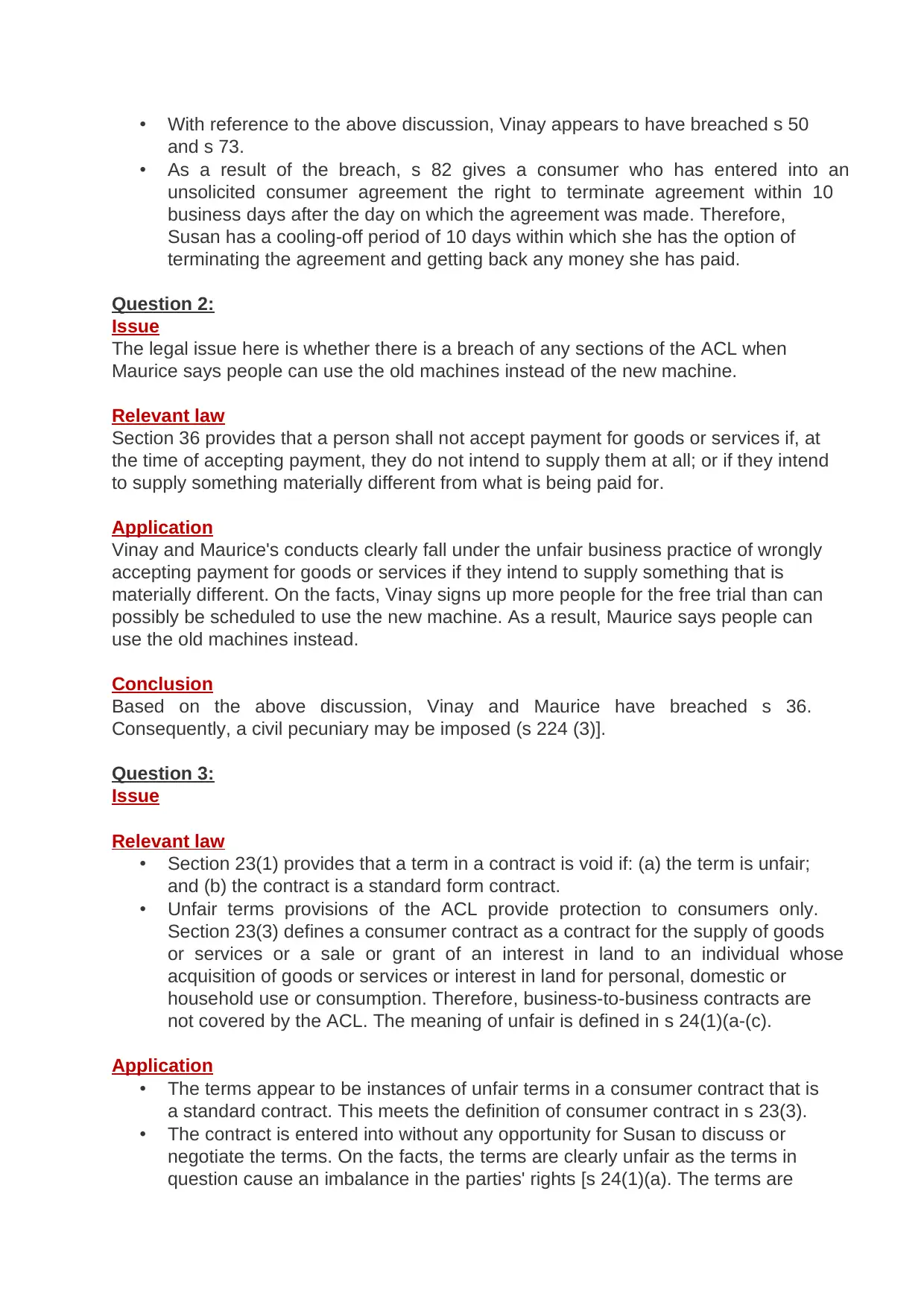
• With reference to the above discussion, Vinay appears to have breached s 50
and s 73.
• As a result of the breach, s 82 gives a consumer who has entered into an
unsolicited consumer agreement the right to terminate agreement within 10
business days after the day on which the agreement was made. Therefore,
Susan has a cooling-off period of 10 days within which she has the option of
terminating the agreement and getting back any money she has paid.
Question 2:
Issue
The legal issue here is whether there is a breach of any sections of the ACL when
Maurice says people can use the old machines instead of the new machine.
Relevant law
Section 36 provides that a person shall not accept payment for goods or services if, at
the time of accepting payment, they do not intend to supply them at all; or if they intend
to supply something materially different from what is being paid for.
Application
Vinay and Maurice's conducts clearly fall under the unfair business practice of wrongly
accepting payment for goods or services if they intend to supply something that is
materially different. On the facts, Vinay signs up more people for the free trial than can
possibly be scheduled to use the new machine. As a result, Maurice says people can
use the old machines instead.
Conclusion
Based on the above discussion, Vinay and Maurice have breached s 36.
Consequently, a civil pecuniary may be imposed (s 224 (3)].
Question 3:
Issue
Relevant law
• Section 23(1) provides that a term in a contract is void if: (a) the term is unfair;
and (b) the contract is a standard form contract.
• Unfair terms provisions of the ACL provide protection to consumers only.
Section 23(3) defines a consumer contract as a contract for the supply of goods
or services or a sale or grant of an interest in land to an individual whose
acquisition of goods or services or interest in land for personal, domestic or
household use or consumption. Therefore, business-to-business contracts are
not covered by the ACL. The meaning of unfair is defined in s 24(1)(a-(c).
Application
• The terms appear to be instances of unfair terms in a consumer contract that is
a standard contract. This meets the definition of consumer contract in s 23(3).
• The contract is entered into without any opportunity for Susan to discuss or
negotiate the terms. On the facts, the terms are clearly unfair as the terms in
question cause an imbalance in the parties' rights [s 24(1)(a). The terms are
and s 73.
• As a result of the breach, s 82 gives a consumer who has entered into an
unsolicited consumer agreement the right to terminate agreement within 10
business days after the day on which the agreement was made. Therefore,
Susan has a cooling-off period of 10 days within which she has the option of
terminating the agreement and getting back any money she has paid.
Question 2:
Issue
The legal issue here is whether there is a breach of any sections of the ACL when
Maurice says people can use the old machines instead of the new machine.
Relevant law
Section 36 provides that a person shall not accept payment for goods or services if, at
the time of accepting payment, they do not intend to supply them at all; or if they intend
to supply something materially different from what is being paid for.
Application
Vinay and Maurice's conducts clearly fall under the unfair business practice of wrongly
accepting payment for goods or services if they intend to supply something that is
materially different. On the facts, Vinay signs up more people for the free trial than can
possibly be scheduled to use the new machine. As a result, Maurice says people can
use the old machines instead.
Conclusion
Based on the above discussion, Vinay and Maurice have breached s 36.
Consequently, a civil pecuniary may be imposed (s 224 (3)].
Question 3:
Issue
Relevant law
• Section 23(1) provides that a term in a contract is void if: (a) the term is unfair;
and (b) the contract is a standard form contract.
• Unfair terms provisions of the ACL provide protection to consumers only.
Section 23(3) defines a consumer contract as a contract for the supply of goods
or services or a sale or grant of an interest in land to an individual whose
acquisition of goods or services or interest in land for personal, domestic or
household use or consumption. Therefore, business-to-business contracts are
not covered by the ACL. The meaning of unfair is defined in s 24(1)(a-(c).
Application
• The terms appear to be instances of unfair terms in a consumer contract that is
a standard contract. This meets the definition of consumer contract in s 23(3).
• The contract is entered into without any opportunity for Susan to discuss or
negotiate the terms. On the facts, the terms are clearly unfair as the terms in
question cause an imbalance in the parties' rights [s 24(1)(a). The terms are
⊘ This is a preview!⊘
Do you want full access?
Subscribe today to unlock all pages.

Trusted by 1+ million students worldwide
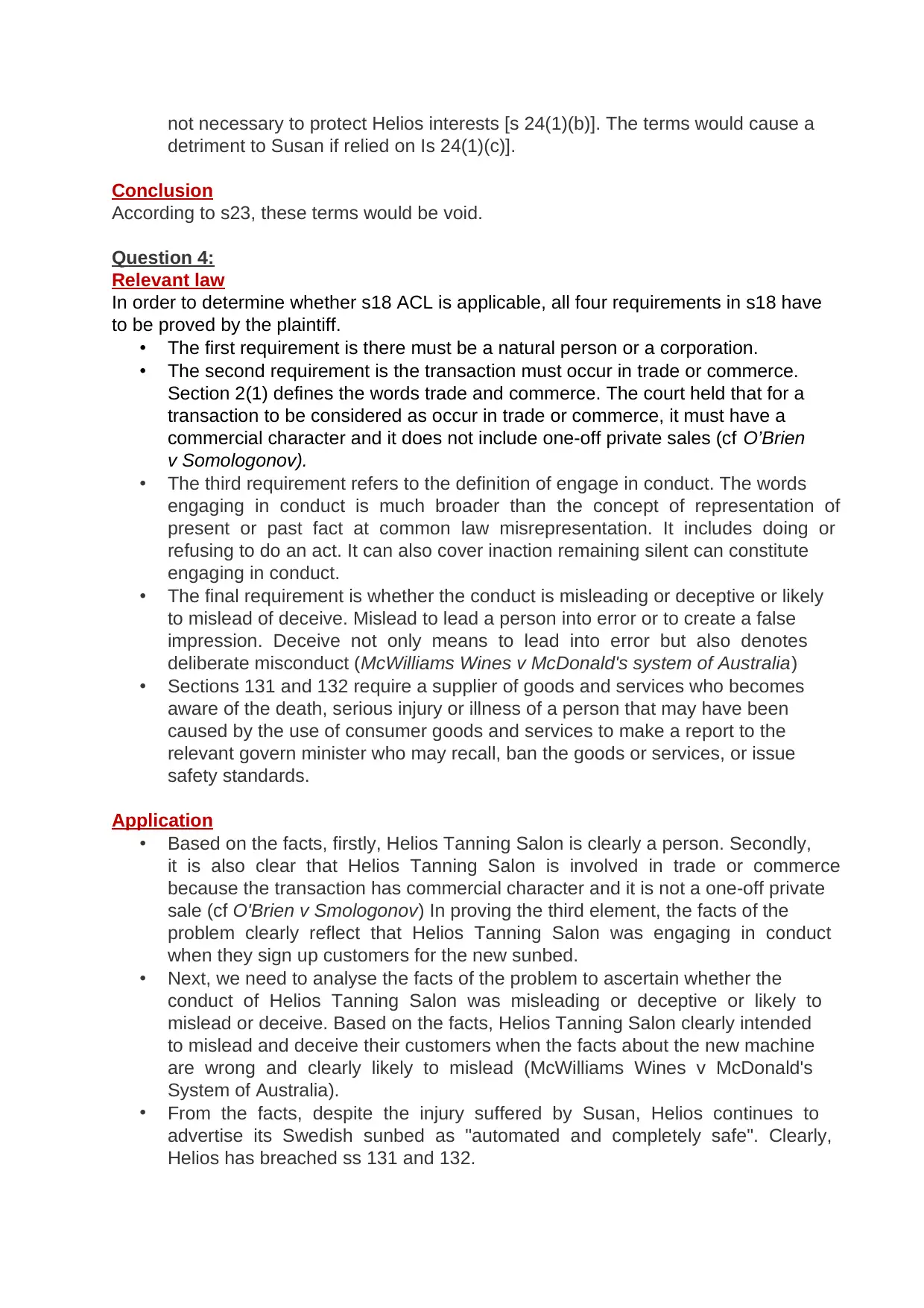
not necessary to protect Helios interests [s 24(1)(b)]. The terms would cause a
detriment to Susan if relied on Is 24(1)(c)].
Conclusion
According to s23, these terms would be void.
Question 4:
Relevant law
In order to determine whether s18 ACL is applicable, all four requirements in s18 have
to be proved by the plaintiff.
• The first requirement is there must be a natural person or a corporation.
• The second requirement is the transaction must occur in trade or commerce.
Section 2(1) defines the words trade and commerce. The court held that for a
transaction to be considered as occur in trade or commerce, it must have a
commercial character and it does not include one-off private sales (cf O’Brien
v Somologonov).
• The third requirement refers to the definition of engage in conduct. The words
engaging in conduct is much broader than the concept of representation of
present or past fact at common law misrepresentation. It includes doing or
refusing to do an act. It can also cover inaction remaining silent can constitute
engaging in conduct.
• The final requirement is whether the conduct is misleading or deceptive or likely
to mislead of deceive. Mislead to lead a person into error or to create a false
impression. Deceive not only means to lead into error but also denotes
deliberate misconduct (McWilliams Wines v McDonald's system of Australia)
• Sections 131 and 132 require a supplier of goods and services who becomes
aware of the death, serious injury or illness of a person that may have been
caused by the use of consumer goods and services to make a report to the
relevant govern minister who may recall, ban the goods or services, or issue
safety standards.
Application
• Based on the facts, firstly, Helios Tanning Salon is clearly a person. Secondly,
it is also clear that Helios Tanning Salon is involved in trade or commerce
because the transaction has commercial character and it is not a one-off private
sale (cf O'Brien v Smologonov) In proving the third element, the facts of the
problem clearly reflect that Helios Tanning Salon was engaging in conduct
when they sign up customers for the new sunbed.
• Next, we need to analyse the facts of the problem to ascertain whether the
conduct of Helios Tanning Salon was misleading or deceptive or likely to
mislead or deceive. Based on the facts, Helios Tanning Salon clearly intended
to mislead and deceive their customers when the facts about the new machine
are wrong and clearly likely to mislead (McWilliams Wines v McDonald's
System of Australia).
• From the facts, despite the injury suffered by Susan, Helios continues to
advertise its Swedish sunbed as "automated and completely safe". Clearly,
Helios has breached ss 131 and 132.
detriment to Susan if relied on Is 24(1)(c)].
Conclusion
According to s23, these terms would be void.
Question 4:
Relevant law
In order to determine whether s18 ACL is applicable, all four requirements in s18 have
to be proved by the plaintiff.
• The first requirement is there must be a natural person or a corporation.
• The second requirement is the transaction must occur in trade or commerce.
Section 2(1) defines the words trade and commerce. The court held that for a
transaction to be considered as occur in trade or commerce, it must have a
commercial character and it does not include one-off private sales (cf O’Brien
v Somologonov).
• The third requirement refers to the definition of engage in conduct. The words
engaging in conduct is much broader than the concept of representation of
present or past fact at common law misrepresentation. It includes doing or
refusing to do an act. It can also cover inaction remaining silent can constitute
engaging in conduct.
• The final requirement is whether the conduct is misleading or deceptive or likely
to mislead of deceive. Mislead to lead a person into error or to create a false
impression. Deceive not only means to lead into error but also denotes
deliberate misconduct (McWilliams Wines v McDonald's system of Australia)
• Sections 131 and 132 require a supplier of goods and services who becomes
aware of the death, serious injury or illness of a person that may have been
caused by the use of consumer goods and services to make a report to the
relevant govern minister who may recall, ban the goods or services, or issue
safety standards.
Application
• Based on the facts, firstly, Helios Tanning Salon is clearly a person. Secondly,
it is also clear that Helios Tanning Salon is involved in trade or commerce
because the transaction has commercial character and it is not a one-off private
sale (cf O'Brien v Smologonov) In proving the third element, the facts of the
problem clearly reflect that Helios Tanning Salon was engaging in conduct
when they sign up customers for the new sunbed.
• Next, we need to analyse the facts of the problem to ascertain whether the
conduct of Helios Tanning Salon was misleading or deceptive or likely to
mislead or deceive. Based on the facts, Helios Tanning Salon clearly intended
to mislead and deceive their customers when the facts about the new machine
are wrong and clearly likely to mislead (McWilliams Wines v McDonald's
System of Australia).
• From the facts, despite the injury suffered by Susan, Helios continues to
advertise its Swedish sunbed as "automated and completely safe". Clearly,
Helios has breached ss 131 and 132.
Paraphrase This Document
Need a fresh take? Get an instant paraphrase of this document with our AI Paraphraser
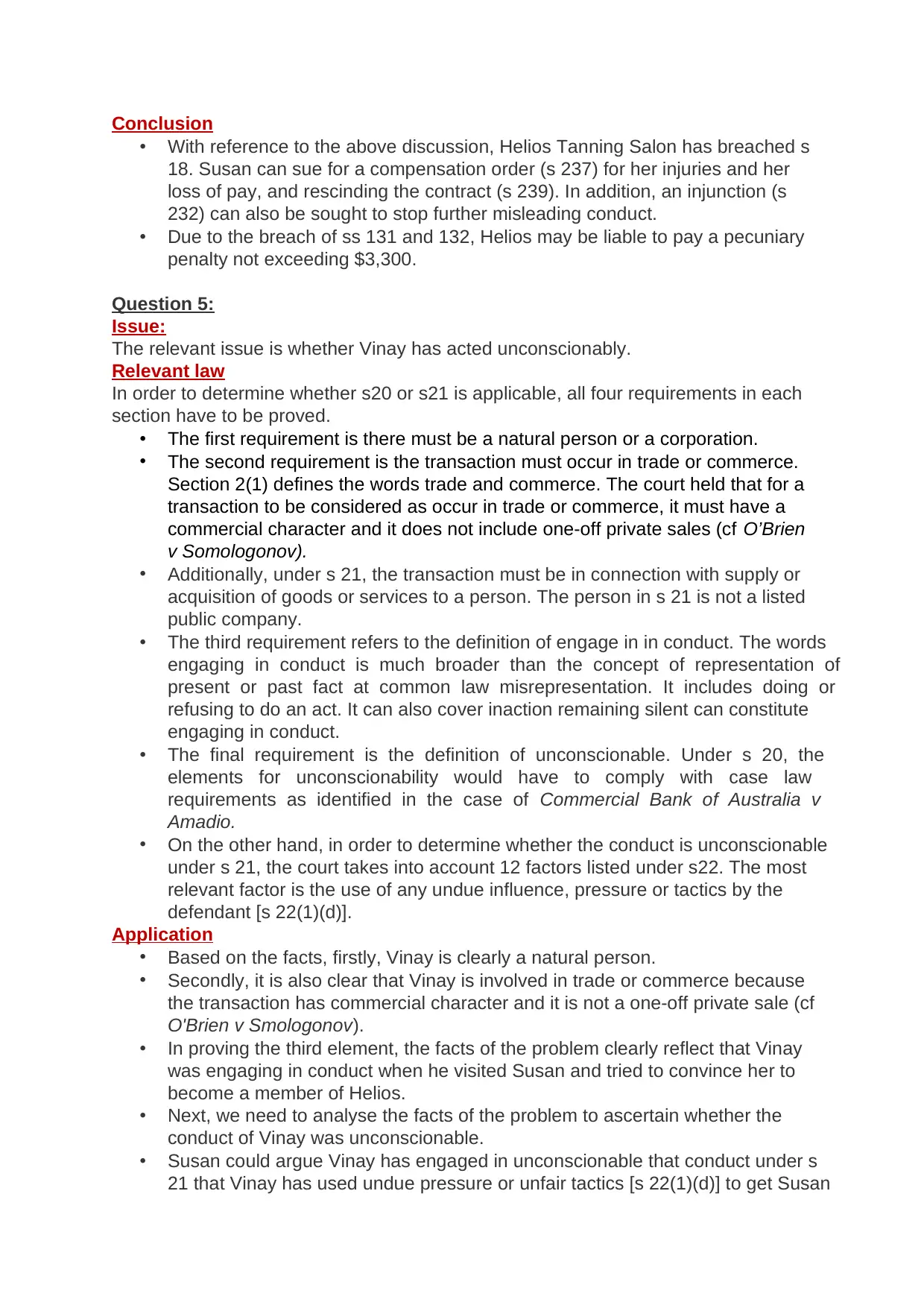
Conclusion
• With reference to the above discussion, Helios Tanning Salon has breached s
18. Susan can sue for a compensation order (s 237) for her injuries and her
loss of pay, and rescinding the contract (s 239). In addition, an injunction (s
232) can also be sought to stop further misleading conduct.
• Due to the breach of ss 131 and 132, Helios may be liable to pay a pecuniary
penalty not exceeding $3,300.
Question 5:
Issue:
The relevant issue is whether Vinay has acted unconscionably.
Relevant law
In order to determine whether s20 or s21 is applicable, all four requirements in each
section have to be proved.
• The first requirement is there must be a natural person or a corporation.
• The second requirement is the transaction must occur in trade or commerce.
Section 2(1) defines the words trade and commerce. The court held that for a
transaction to be considered as occur in trade or commerce, it must have a
commercial character and it does not include one-off private sales (cf O’Brien
v Somologonov).
• Additionally, under s 21, the transaction must be in connection with supply or
acquisition of goods or services to a person. The person in s 21 is not a listed
public company.
• The third requirement refers to the definition of engage in in conduct. The words
engaging in conduct is much broader than the concept of representation of
present or past fact at common law misrepresentation. It includes doing or
refusing to do an act. It can also cover inaction remaining silent can constitute
engaging in conduct.
• The final requirement is the definition of unconscionable. Under s 20, the
elements for unconscionability would have to comply with case law
requirements as identified in the case of Commercial Bank of Australia v
Amadio.
• On the other hand, in order to determine whether the conduct is unconscionable
under s 21, the court takes into account 12 factors listed under s22. The most
relevant factor is the use of any undue influence, pressure or tactics by the
defendant [s 22(1)(d)].
Application
• Based on the facts, firstly, Vinay is clearly a natural person.
• Secondly, it is also clear that Vinay is involved in trade or commerce because
the transaction has commercial character and it is not a one-off private sale (cf
O'Brien v Smologonov).
• In proving the third element, the facts of the problem clearly reflect that Vinay
was engaging in conduct when he visited Susan and tried to convince her to
become a member of Helios.
• Next, we need to analyse the facts of the problem to ascertain whether the
conduct of Vinay was unconscionable.
• Susan could argue Vinay has engaged in unconscionable that conduct under s
21 that Vinay has used undue pressure or unfair tactics [s 22(1)(d)] to get Susan
• With reference to the above discussion, Helios Tanning Salon has breached s
18. Susan can sue for a compensation order (s 237) for her injuries and her
loss of pay, and rescinding the contract (s 239). In addition, an injunction (s
232) can also be sought to stop further misleading conduct.
• Due to the breach of ss 131 and 132, Helios may be liable to pay a pecuniary
penalty not exceeding $3,300.
Question 5:
Issue:
The relevant issue is whether Vinay has acted unconscionably.
Relevant law
In order to determine whether s20 or s21 is applicable, all four requirements in each
section have to be proved.
• The first requirement is there must be a natural person or a corporation.
• The second requirement is the transaction must occur in trade or commerce.
Section 2(1) defines the words trade and commerce. The court held that for a
transaction to be considered as occur in trade or commerce, it must have a
commercial character and it does not include one-off private sales (cf O’Brien
v Somologonov).
• Additionally, under s 21, the transaction must be in connection with supply or
acquisition of goods or services to a person. The person in s 21 is not a listed
public company.
• The third requirement refers to the definition of engage in in conduct. The words
engaging in conduct is much broader than the concept of representation of
present or past fact at common law misrepresentation. It includes doing or
refusing to do an act. It can also cover inaction remaining silent can constitute
engaging in conduct.
• The final requirement is the definition of unconscionable. Under s 20, the
elements for unconscionability would have to comply with case law
requirements as identified in the case of Commercial Bank of Australia v
Amadio.
• On the other hand, in order to determine whether the conduct is unconscionable
under s 21, the court takes into account 12 factors listed under s22. The most
relevant factor is the use of any undue influence, pressure or tactics by the
defendant [s 22(1)(d)].
Application
• Based on the facts, firstly, Vinay is clearly a natural person.
• Secondly, it is also clear that Vinay is involved in trade or commerce because
the transaction has commercial character and it is not a one-off private sale (cf
O'Brien v Smologonov).
• In proving the third element, the facts of the problem clearly reflect that Vinay
was engaging in conduct when he visited Susan and tried to convince her to
become a member of Helios.
• Next, we need to analyse the facts of the problem to ascertain whether the
conduct of Vinay was unconscionable.
• Susan could argue Vinay has engaged in unconscionable that conduct under s
21 that Vinay has used undue pressure or unfair tactics [s 22(1)(d)] to get Susan
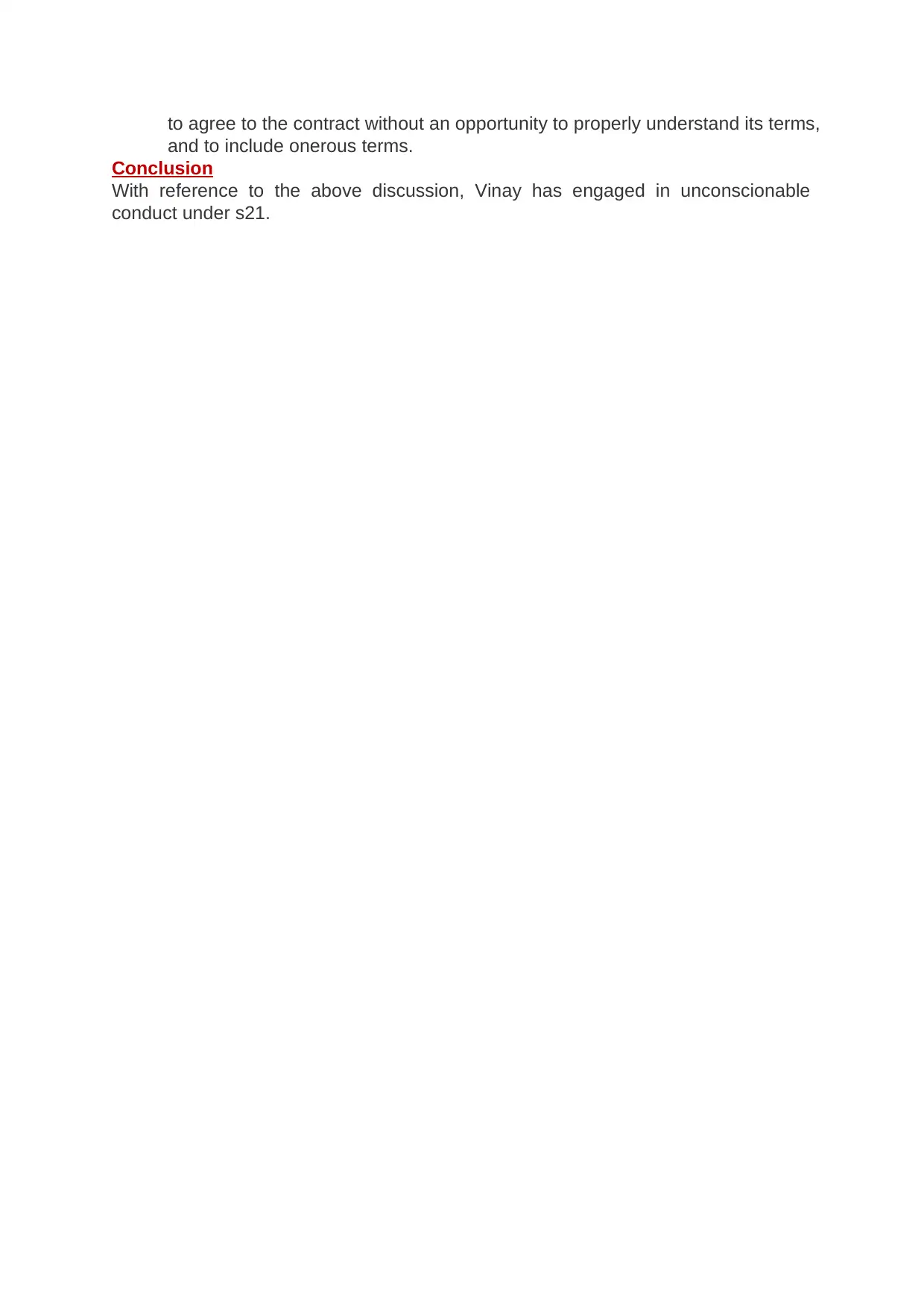
to agree to the contract without an opportunity to properly understand its terms,
and to include onerous terms.
Conclusion
With reference to the above discussion, Vinay has engaged in unconscionable
conduct under s21.
and to include onerous terms.
Conclusion
With reference to the above discussion, Vinay has engaged in unconscionable
conduct under s21.
⊘ This is a preview!⊘
Do you want full access?
Subscribe today to unlock all pages.

Trusted by 1+ million students worldwide
1 out of 9
Related Documents
Your All-in-One AI-Powered Toolkit for Academic Success.
+13062052269
info@desklib.com
Available 24*7 on WhatsApp / Email
![[object Object]](/_next/static/media/star-bottom.7253800d.svg)
Unlock your academic potential
Copyright © 2020–2026 A2Z Services. All Rights Reserved. Developed and managed by ZUCOL.





